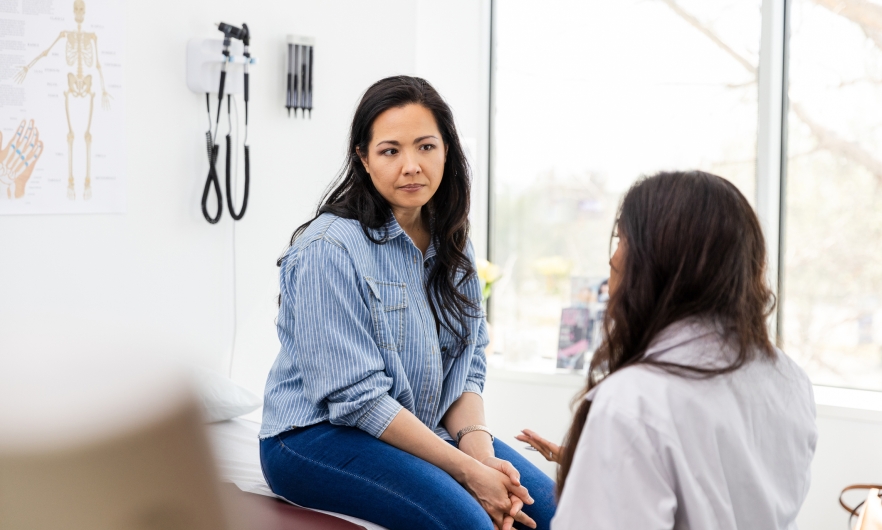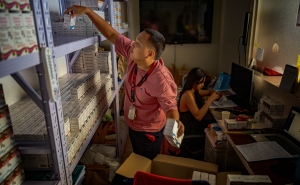The Rise of Colorectal Cancers Among Younger People

Since 1980, the risk of dying from colorectal cancer for all Americans has halved—a huge success in both good screening and treatment. Yet the risk for people under age 55 has increased, leading the U.S. Preventive Services Task Force to change its recommendation for the age at which adults should begin colorectal cancer screenings from 50 to 45.
In this Q&A, adapted from the June 5 episode of Public Health On Call, Stephanie Desmon speaks to Otis Brawley, MD, a globally recognized expert in cancer prevention and control whose work focuses on developing cancer screening strategies and ensuring their effectiveness. Brawley, a Bloomberg Distinguished Professor with appointments in Epidemiology and the Sidney Kimmel Comprehensive Cancer Center, discusses possible reasons why we’re seeing colorectal cancers earlier, who is most at risk, the screening tools currently available, and why blood tests may be even more valuable than costly and invasive colonoscopies.
Colon and rectal cancers are on the rise, especially among those under the age of 50, and are declining for those over the age of 65. What's going on here?
In the United States, about 150,000 people get diagnosed with colorectal cancer every year, and about 52,000–53,000 die from the disease every year. Since 1980 the risk of dying from colorectal cancer for all Americans has halved. This is a real success in both good screening and good treatment.
Unfortunately, the risk for people under age 55 has gone up, and it's gone up more recently. In the 1990s, every year about 10,000 of the 150,000 people who were diagnosed with colorectal cancer were under 50. That number has doubled to 20,000 people per year within the last 20–25 years.
We don't know exactly why, but we have some suspicions. As you would expect, colorectal cancer is very intimately entwined with diet, and our diet in the U.S. is changing dramatically. We're eating a lot more processed and ultra-processed foods. Another significant change is seen in the current generation of people in their 40s, who have received far more antibiotics than any previous generation. The overuse of antibiotics changes the bacterial flora of the gut and kills the good bacteria in our colon.
We also have an obesity epidemic in the U.S. In 1970, 15% of Americans were obese. Today, it's well over 40%. In certain communities, say the Black female community, it's over 60%, and obesity does drive colorectal cancer. All of these things are coming together and may very well create the perfect storm to cause younger people to get colorectal cancer. When I say younger people, it's primarily people ages 45 to 55, but we also see a slight rise among people age 40 to 45, and a smaller increase among people even in their late 30s.
The recommended cancer screening age was recently lowered. Why?
We have a number of studies that consistently tell us that screening people ages 50 to 75 for colorectal cancer saves lives. Screenings can be a colonoscopy every 10 years, a stool blood testing every year, or a stool DNA test every three years. All three tests are equal. Some people think a colonoscopy is supreme—that's not true. The best test is the test that's available to you. I say that because there are people who need to drive three hours in order to get a colonoscopy, and colonoscopy can cost $3,000, while a stool blood test costs $30. Now, if you do have a positive stool blood test, then you need to get that colonoscopy.
I was the chief medical officer of the American Cancer Society, and I was on the committee that suggested that we should start offering regular screenings to people at age 45 rather than at age 50. We decided on age 45 because that's where the majority of the problem is right now—in people ages 45 to 55. And for people under age 45, should just be aware of colorectal cancer symptoms and know when it’s worth having a conversation with their doctor to get tested.
I'm surprised to hear you say that the other tests are just as good as colonoscopies. Can you tell me more?
I like to look at clinical trials. The study that told us that colonoscopies save lives was a study of almost 200,000 people that started in the 1970s at the University of Minnesota. It randomized people to stool blood testing every year, every two years, or no stool blood testing at all. If one had a positive stool blood test, they would get a colonoscopy. Since then, the study has reported in the New England Journal of Medicine that among people who got stool blood testing every year, there was a 33% reduction in risk of colorectal cancer death and a 20% reduction in getting colorectal cancer. This is because people who had stool blood testing every year and had a positive stool blood test went on to get a colonoscopy that either found an early cancer or a polyp that could be removed.
This study shows us that stool blood testing on an annual basis is associated with reducing the risk of getting colorectal cancer through finding these polyps, which are really pre-cancers.
A lot of people think that colonoscopy is the gold standard, but the truth is, we have no data to show that a colonoscopy every 10 years is better than stool blood testing every year. If I recommend a colonoscopy every 10 years for everybody in the U.S., and then I look at the gastroenterologist (GI) doctor distribution—there aren’t enough GI docs to do a colonoscopy every 10 years for everyone starting at age 50. Now that we moved the recommended screening age to 45, we have a problem of not having enough GI docs to do all the screenings that would be necessary if we only use colonoscopy. So again, I'm grateful that the data show that we have tests beyond colonoscopy screening that are just as effective.
I should also point out that some people are at higher risk for colorectal cancer. If you have cousins, sisters, brothers, aunts, uncles, or parents who have had colorectal cancer in their 20s and 30s, then talk to your doctor because screening and surveillance for you may be different from the recommendation for the general population.
So, we have an obesity problem, a diet problem, and an antibiotic problem. What can we do?
This obesity issue starts in childhood. In 1970, 5% of kids were obese, and that number has risen to 20% today. We frequently say cancer prevention is a pediatric problem and we need to worry about this in our kids who are 5, 6, and 7 years old. We need to try to eat five to nine servings of fruits and vegetables every day, get 30 minutes of exercise four times a week to maintain ideal body weight, avoid processed and ultra-processed foods, and limit red meat consumption to no more than three times a week. All of these things over a period of 20, 30, or 40 years will lower one's risk of colorectal cancer.
Is there one overall message you want people to come away with?
40% of Americans over the age of 50 have either never gotten screened for colorectal cancer or are not up to date for screening for colorectal cancer—that’s a colonoscopy every 10 years, stool blood testing every year, or stool DNA testing every three years. If we went from 60% of people over the age of 50 getting up to date on screening to 70% being up to date, the number of lives that could be saved would be significant. I want to promote awareness of this disease and screening for it not only among younger people but among people over 55, as well.
This interview was edited for length and clarity by Grace Fernandez Cecere.





